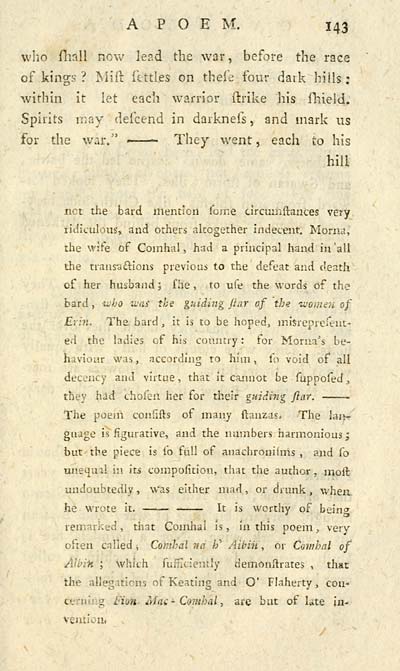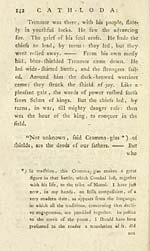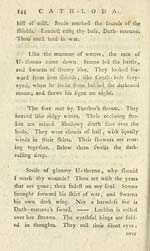Download files
Complete book:
Individual page:
Thumbnail gallery: Grid view | List view

A P O E M. 143
wliO flinll ncvv' le?.d the war, before the race
of kings 'i Miil fettles on thefe four dark hiils :
within it let each warrior ftrike his ihield.
Spirits may defcend in darknefs , and mark us
for the war." ■ They went, each to his
hill
net the bard mention fome circuailtances very
ridiculous, and others altogether indecent. Morna,
the wife of Comhal, had a principal hand in "all
the transitions previous to the defeat and death
of her husband ; fhe , to ufe the words of the
bard , -ivho ivas the guiding Jlar of the ivo^nen of
Erin. The bard , it is to be hoped, misreprefent-
ed the ladies of his country : for Morna's be-
haviour was , according to him , io void of all
decency and virtue, that it cajniot be fuppofed^
they had chofen her for their guiding ftar.
The poeni confifts of manj ftanzas. The laitr
guage is figurative, and the numbers harmonious j
but the piece is fo full of anachroniims , and lb
unequal in hs compofition, that the author , moft
undoubtedly , was either mad , or drunk , when.
he wrote it. It is worthy of bein<T
remarked, that Comhal is, in this poem, verv
often called i Comhal n a /?' Aihiii, or Cawhal of
Albiii ; which fufnciently demonftrates , that
the allegations of Keating and O' Flaherty, cou'
cern!r:g Fiun Mac -Comhal, arc but of lute in-
vention.
wliO flinll ncvv' le?.d the war, before the race
of kings 'i Miil fettles on thefe four dark hiils :
within it let each warrior ftrike his ihield.
Spirits may defcend in darknefs , and mark us
for the war." ■ They went, each to his
hill
net the bard mention fome circuailtances very
ridiculous, and others altogether indecent. Morna,
the wife of Comhal, had a principal hand in "all
the transitions previous to the defeat and death
of her husband ; fhe , to ufe the words of the
bard , -ivho ivas the guiding Jlar of the ivo^nen of
Erin. The bard , it is to be hoped, misreprefent-
ed the ladies of his country : for Morna's be-
haviour was , according to him , io void of all
decency and virtue, that it cajniot be fuppofed^
they had chofen her for their guiding ftar.
The poeni confifts of manj ftanzas. The laitr
guage is figurative, and the numbers harmonious j
but the piece is fo full of anachroniims , and lb
unequal in hs compofition, that the author , moft
undoubtedly , was either mad , or drunk , when.
he wrote it. It is worthy of bein<T
remarked, that Comhal is, in this poem, verv
often called i Comhal n a /?' Aihiii, or Cawhal of
Albiii ; which fufnciently demonftrates , that
the allegations of Keating and O' Flaherty, cou'
cern!r:g Fiun Mac -Comhal, arc but of lute in-
vention.
Set display mode to: Large image | Transcription
Images and transcriptions on this page, including medium image downloads, may be used under the Creative Commons Attribution 4.0 International Licence unless otherwise stated. ![]()
| Early Gaelic Book Collections > Ossian Collection > Works of Ossian, the son of Fingal > Volumes 3 and 4 > (419) |
|---|
| Permanent URL | https://digital.nls.uk/77974268 |
|---|
| Description | Volumes III and IV. |
|---|---|
| Shelfmark | Oss.162 |
| Additional NLS resources: | |
| Attribution and copyright: |
|
| Description | Printed for I.G. Fleischer (Frankfurt, 1783). 4 volumes bound in 2. |
|---|---|
| Shelfmark | Oss.161-162 |
| Additional NLS resources: | |
| Description | Selected books from the Ossian Collection of 327 volumes, originally assembled by J. Norman Methven of Perth. Different editions and translations of James MacPherson's epic poem 'Ossian', some with a map of the 'Kingdom of Connor'. Also secondary material relating to Ossianic poetry and the Ossian controversy. |
|---|
| Description | Selected items from five 'Special and Named Printed Collections'. Includes books in Gaelic and other Celtic languages, works about the Gaels, their languages, literature, culture and history. |
|---|

